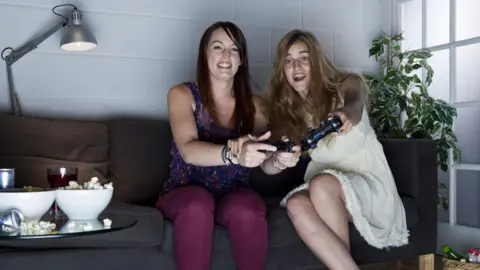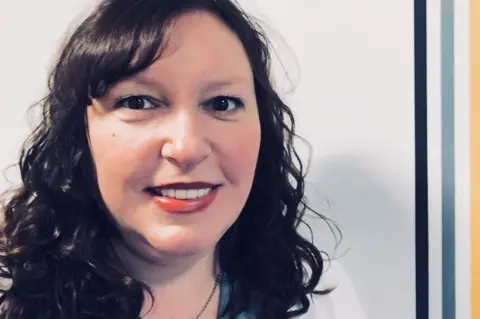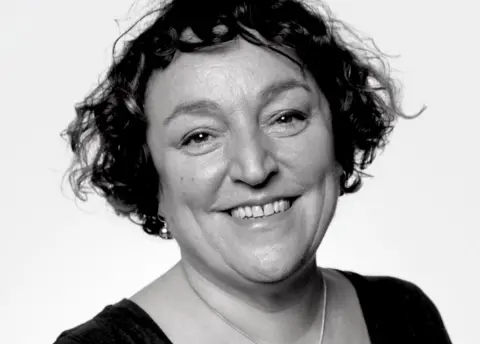University of Suffolk hosts all-female games jam
 Getty Images
Getty ImagesAn all-female games jam has been set up to try to tackle the "gender imbalance" in the industry.
Teams at the Gals that Game event at the University of Suffolk will develop their own game over two days.
Heidi Love, one of the organisers, said it was an "amazing opportunity to meet and work with like-minded people".
The chief executive of gaming body Tiga, Richard Wilson, said "we really must encourage more women to pursue a career in the sector".
He said only 12% of UK game developers were women, despite making up about half of video gamers.
The chief executive of Women in Games, Marie-Claire Isaaman, said there was "a gender imbalance in the games industry", but that the situation was improving.
So what do women already in the industry see as potential barriers?
The student: 'It's a bit intimidating'
 Heather Bishop
Heather BishopHeather Bishop is the only woman on the University of Suffolk's Games Hub programme this year.
During her undergraduate degree, she was one of only 11 women out of more than 100 people, as well as being a mature student.
"It's a bit of an intimidating situation to start a course where there's an age gap, and you are also one of the only girls.
"After the initial excitement and awkwardness faded we all got on really well," the 28-year-old said.
Miss Bishop, from Harwich, Essex, said she thought some women could be put off by "technical" elements, but that her degree "had been weighted more on the creative side".
She is now doing a master's degree, and her dream is to set up her own studio in Suffolk.
The lecturer: 'Maybe it starts early on'
 Sian Cook
Sian CookHeidi Love runs the Games Hub at the University of Suffolk.
The voluntary 10-week programme is designed to help final year students learn business skills.
Since it was launched in 2016, she said there had only been four women on the programme.
"Maybe it starts early on, maybe they didn't do the STEM subjects (science, technology, engineering and maths) and got too far along," she said.
She said the free event in August would give women the chance to discover how "making games is a great mix of storytelling, art, design and development".
"You don't have to be a coder, it's for women who are interested, thinking about doing a degree at some point or want to know about the games industry."
The CEO: 'Culturally it feels quite masculine'
 Marie-Claire Isaaman
Marie-Claire IsaamanMarie-Claire Isaaman is the chief executive of Women in Games.
The not-for-profit organisation was set up 10 years ago to recruit more women into the games industry and to support those already in it.
The former course leader and senior researcher at Norwich University of the Arts said the sector "culturally feels quite masculine".
"Girls when they look at it, they can't see themselves in it, it's not glamorous like the film industry."
She said some parts of the industry had been slow to address gender inequality, and that events like Gals that Game were important because as a result "young girls are more likely to consider the games industry as a career".
"We are missing out on 50% of the population if we don't get women on to the courses."
Tiga chief executive Richard Wilson said more games needed to "showcase women in lead characters", and that the sector needed to "actively engage" with women to encourage them to work in the industry.
"Clearly we have much more work to do," he said.
